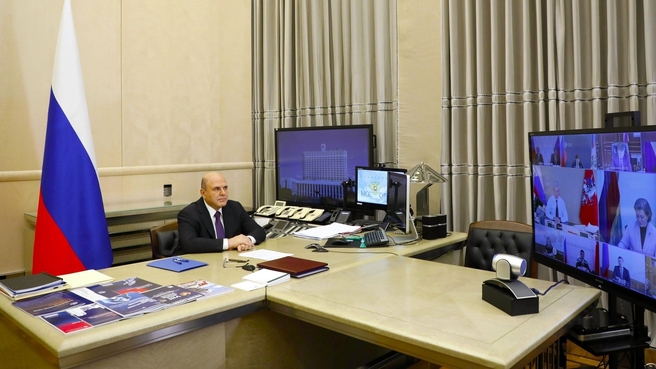Mikhail Mishustin’s opening remarks
Excerpts from the transcript:
Mikhail Mishustin: Good afternoon, colleagues.
Before we begin, I would like to say a few words about today’s date. World Doctors’ Day is marked annually on the first Monday of October. In Russia, we traditionally congratulate our healthcare workers in the summer, in June. But I believe that kind words and gratitude towards these people should be expressed as often as possible.
Thank you for your devotion to saving lives and people’s health, a devotion that you never abandon even in the most difficult conditions, like now. We value and respect your self-sacrificing efforts and your readiness to come to the rescue. I heartily wish all our doctors good health and many successes.
Colleagues, the coronavirus pandemic has shown that it is crucially important to be ready for possible threats in order to protect people’s lives and health. To that end, the Federal Law On Biological Safety in the Russian Federation was signed by the President late last year. It provides for a comprehensive regulation in this area and includes the creation of a national registry of collectible strains of pathogenic microorganisms and viruses. The Government has prepared relevant resolutions for the creation of such registry.
It will be an integrated and constantly updated database of all kinds of bacteria and viruses that can cause diseases in humans, animals and plants. Scientists will be able to make effective use of these collections in their research, including in the development of vaccines.
Now let us move on to the main topic of this meeting. COVID-19 continues to spread. We considered this in detail at the previous meeting of the Coordination Council’s Presidium last Thursday. Today, we will discuss the developments on the national scale with the participation of the heads of regions.
The dynamics we have watched during the last few days is causing much concern. The incidence of the disease is growing in the majority of the Russian regions. Many patients are staying in hospitals, two times as much as at the same period last year.
We continue to take measures at the federal level, seeing to it that the Russian health system is able to work stably and patients get the medical aid they need. We make sure that hospitals have equipment, medical products, medications and, of course, oxygen. We are allocating funds to provide medicines to patients receiving treatment at home. There are sufficient stocks of face masks and other types of personal protective equipment (PPE). We are maintaining a high level of testing.
All regions, without exception, have made provisions to enable residents to get inoculated against COVID-19. We have also built up reserves of medications. But the vaccination levels are insufficiently high to stop the spread of the infection.
The state of affairs is even more difficult because of the onset of the cold and flu season. This is also putting an extra burden on doctors.
Each region is facing a challenge of its own and the rates at which the infection is spreading may vary. Anti-virus measures must be adopted with account taken of these factors. It is important to adjust the organisation of medical aid based primarily on medical doctors’ recommendations. Hospitals must be ready for any kind of development. For this, it is necessary to forecast the need for medicines based on the actual rise in the number of hospitalisations and build up bed capacity well in advance. Currently, there are 50 percent more beds at the ready than last autumn.










